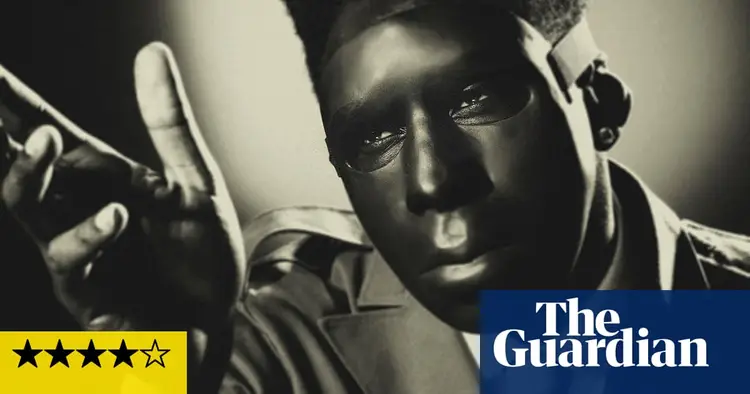Tyler, the Creator: Chromakopia review – early midlife crisis triggers a freaked-out psychodrama

Tyler, the Creator's announcement of his seventh album caught many off guard, especially since he had previously said on social media that he wouldn't be putting out any new music this year. In the weeks leading up to the release, the marketing hinted that "Chromakopia" would be an intricate project, one that listeners would need time to fully understand. The campaign featured a series of enigmatic videos transitioning from the muted colors of an old television show to vibrant hues. In some, Tyler donned a mask and military attire, leading a group of men toward a shipping container marked with the album's title, which he later blew up. In another scene, he pushed through a crowd only to be confronted by an overly enthusiastic fan whose excitement turned chaotic, and whose phone morphed into a gun. He also performed on top of a military aircraft where his masked counterpart watched menacingly from within. This all led to various theories about the meaning behind the visuals, as it was clearly intended for speculation. One popular idea was that the album would introduce a new character or persona, possibly inspired by a figure from the beloved children’s book "The Phantom Tollbooth."
Similar to the earlier announcement of no new music being released, the situation with the mask seems to be a form of distraction, at least regarding the idea of a persona. The lyrics in *Chromakopia* come across as both ordinary and deeply personal. It’s striking that none of the featured artists, including Lil Wayne and Childish Gambino, are credited on streaming platforms; this choice seems to emphasize the album’s introspective vibe rather than draw attention to its collaborators. The songs touch on the weight of fame—where tracks like "Noid" and "Rat Tah Tah" express skepticism about everyone from Tyler, the Creator’s accountants to his fans. There’s also a bold rebuttal to his detractors in "Thought I Was Dead." However, the overarching themes are relatable concerns that often arise in your 30s, a time when even the most carefree individuals face the reality of adulthood. Questions arise about whether not having a lasting relationship means a lifetime of solitude, whether one is ready for parenthood, the fear of repeating their parents' mistakes, and whether their chosen career path brings true fulfillment.
These questions are often tough to tackle, which might explain the uneasy tone in Chromakopia. The lyrics tend to loop back and contradict one another, fluctuating between confident self-praise and intense feelings of inadequacy and self-hate, sometimes even within the same verse. In the song "Tomorrow," he shifts from proudly declaring his independence—“I don’t like cages, I’d rather be drowning”—to revealing a deep sense of emptiness: “All I have are pictures of my Ferrari and some ridiculous outfits.”
In other places, the tracks tend to lead to unexpected conclusions. "Judge Judy" begins like a typical sex-themed rhyme, featuring phrases like “body rubs, bondage, and cream pies,” accompanied by a background of moans suggesting pleasure. However, it unexpectedly transforms into a poignant reflection with themes of suicide. Meanwhile, "Like Him" explores the theme of a father's absence, ultimately revealing a message from Tyler, the Creator's mother, who expresses that it's her fault he never got to know his father. In "Take Your Mask Off," he criticizes various individuals for pretending to be something they’re not, from a homophobe who secretly identifies as gay to a wealthy but unsatisfied housewife. He then turns the attention onto himself with the line, “You talk a lot of shit to not even be number one.”
The music carries a similarly chaotic vibe. The tracks often pivot and shift their foundations dramatically, moving swiftly from one sound to another, with substantial changes occurring within just minutes. Musical concepts burst forth in an unpredictable manner. "Noid" is anchored by gritty, heavy guitars reminiscent of metal, yet the power chords seem to short-circuit unexpectedly, creating a strangely unsettling atmosphere; a striking sample from the 70s Zamrock group Ngozi Family clashes with the gentle backing vocals of Willow Smith. In other moments, sparse beats influenced by the Neptunes contrast with the rich harmonies of the Beach Boys, while folky acoustic guitar melodies sit alongside lush synths inspired by G-funk, and even the smooth sounds of an 80s R&B ballad are disrupted by rapid drum rolls. The entire experience is stitched together with a flurry of gasps, grunts, and wild barks weaving through the rhythms, adding a sense of claustrophobia even to the most relaxed tracks.
After an hour, the experience concludes without providing a clear sense of closure. The final song, titled "I Hope You Find Your Way Home," leaves listeners feeling uncertain about that hope. Tyler, the Creator remains in turmoil, expressing, "I'm slipping, I'm slipping... I need a hand," as he struggles with conflicting feelings about his future. What started as the artist denying the album's existence, "Chromakopia" ultimately reveals a state of disarray where everything is constantly changing and nothing is as it first appears. This captivating yet draining journey successfully portrays that sense of confusion.











































